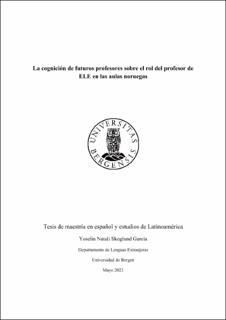La cognición de futuros profesores sobre el rol del profesor de ELE en las aulas noruegas
Master thesis
Permanent lenke
https://hdl.handle.net/11250/3074211Utgivelsesdato
2023-05-15Metadata
Vis full innførselSamlinger
- Master theses [213]
Sammendrag
Con el creciente interés por estudiar la dimensión mental de la profesión docente, se ha mostrado que las investigaciones sobre la cognición docente desde niveles iniciales de la formación académica específica pueden ser fundamental para la disposición y capacidad de futuros profesores de involucrarse en su desarrollo profesional, no solamente durante su formación como docentes, sino a lo largo de su carrera profesional. De esta manera el presente estudio contribuye a entender este sistema de creencias del que pertenecen los futuros profesores sobre el rol del profesor de ELE en las aulas noruegas. El estudio se llevó a cabo con la participación de tres estudiantes en un momento inicial de un curso de formación de profesores en la Universidad de Bergen. Los datos fueron coleccionados a partir de una indagación narrativa que se basa en el uso de metáforas y la creación de un mapa conceptual por los estudiantes. Los estudiantes presentan una legitimación de la enseñanza y el aprendizaje de una lengua extranjera que implica una conceptualización tácita del rol del profesor del español como lengua extranjera (ELE) con tres creencias sobresalientes: 1) un mediador intercultural; 2) un evaluador y su relación a la dimensión afectiva del proceso educativo; 3) un organizador de situaciones de aprendizaje. Uno de los descubrimientos interesantes ha sido que la dimensión emocional que tanto se ha ignorado o subestimado por investigadores, forma parte central en el sistema de creencias de los estudiantes, y que este no solamente está determinado por sus experiencias previas en el ámbito educacional, sino por sus experiencias personales como hablantes de una lengua extranjera. With the growing interest on studying the mental dimension of the teaching profession, it has been shown that research on teacher cognition from initial stages of the teacher education can be essential for the willingness and ability of future teachers to get involved in their professional development, not only during their professional coursework, but throughout their professional career. Thereby, the present study contributes to understanding this belief system to which of future teachers belong to about the role of teachers of spanish as a second foreign language (SSFL) in Norwegian classrooms. The study has been carried out with the participation of three students at an early stage of a teacher training program at the University of Bergen. The data was collected from a narrative inquiry based on the use of metaphors and the creation of a mind map by the students. The students portray a legitimization of the teaching and learning of a foreign language that implies a tacit conceptualization of the role of the teacher of SSFL with the three outstanding beliefs of the teacher as: 1) an intercultural mediator; 2) an evaluator and his relationship to the affective dimension of the educational process; 3) an organizer of learning situations. One of the interesting discoveries has been that the emotional dimension, which frequently has been ignored or underestimated by researchers, form a central part of the students' belief system and that this has not only been modified from their previous experiences in the educational field, but also from their personal experiences as speakers of a foreign language.
